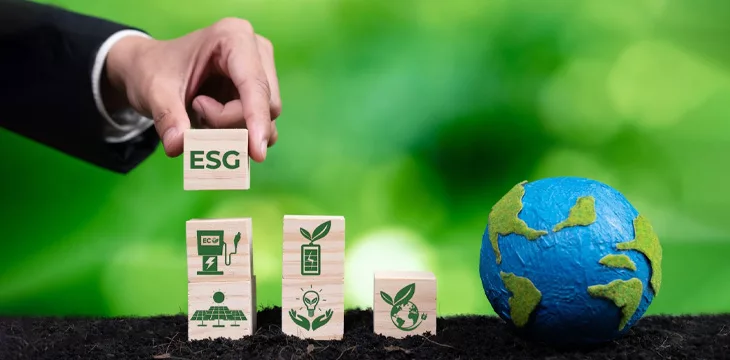|
Getting your Trinity Audio player ready...
|
The Bank for International Settlements (BIS) has announced the “COP28 UAE TechSprint,” an initiative challenging developers to find artificial intelligence (AI), Internet of Things (IoT), and blockchain-based solutions to combat climate change and progress sustainable finance.
The BIS launched an initiative to help combat climate change and unlock new sustainable finance solutions using artificial AI, IoT, sensor technologies, and blockchain.
The “COP28 UAE TechSprint” initiative will take the form of a competition open to developers worldwide. It will challenge teams to find solutions to “data verification gaps in sustainable finance,” with the ultimate aim of “promoting innovation in scaling sustainable finance and combating climate change,” said the BIS, in its September 11 press release.
The initiative is a joint effort from the BIS—an international organization set up to foster monetary and financial cooperation and serving as a bank for central banks—the United Arab Emirates’ COP28 presidency and the Central Bank of the United Arab Emirates.
“Tackling climate change requires available, accessible, and affordable finance,” said Dr. Sultan Al Jaber, COP28 President Designate, when announcing the initiative. “By introducing advanced technological solutions that support the development of sustainable finance standards and instruments, we can help to foster investor confidence and better ensure that capital reaches those who require it the most.”
These comments were echoed by Agustín Carstens, General Manager of the BIS, who said that “combating climate change is more urgent than ever. It calls for a profound change in the way economies operate and grow… Technologies that promote the timely measurement and disclosure of climate-related information are part of the solution.”
In the hopes of speeding up this profound and necessary change in the global finance space, the BIS set out three specific “problem statements,” or gaps in current technological solutions, for participants to address:
- AI solutions for sustainable finance reporting, verification, and disclosure in the financial services industry.
- Blockchain solutions for auditing and enhancing transparency, traceability, and accountability in sustainable finance.
- Internet-of-Things and sensor technology solutions for sustainable finance, to ensure informed assessments of impact, risk, or compliance.
Prospective participants must submit proposals to address one or more of the problem statements by October 6, 2023. All proposals will then be reviewed by the organizers and a shortlist compiled, from which a winner will be announced at the COP28 UAE TechSprint award ceremony and event at COP28 UAE on December 4, 2023.
BSV blockchain: The ready-made blockchain solution
When it comes to the second of the BIS problem statements, one blockchain springs to mind as particularly well suited to enhancing transparency, traceability, and accountability in sustainable finance, the BSV blockchain.
The BSV blockchain is almost infinitely scalable, as evidenced in August when, over the course of a 24-hour period, over 128m million on-chain transactions were processed on the original Bitcoin protocol, setting a new record for transactions in a day and demonstrating how BSV continues to push the boundaries of blockchain scalability.
Due to its ability to process several orders of magnitude more payments and data across the globe than, for example, BTC can for the same power usage, BSV blockchain increases energy efficiency.
This was backed up by a November 2021 study from MNP, the fifth-largest professional accountancy and business consulting firm in Canada, that investigated the energy efficiency of Bitcoin-based blockchain technology, finding BSV blockchain is more energy-efficient than the other two blockchain protocols included in the comparison—BTC and BCH.
This makes BSV blockchain a more eco-friendly and sustainable blockchain solution.
In terms of traceability, developers utilizing the BSV blockchain have already demonstrated the potential benefits BSV offers in this regard. In May, BSV blockchain solutions company Gate2Chain participated in a VIP Dining Experience at Searcys at The Gherkin in London, where it pre-launched its B2B SaaS platform, Trace, in collaboration with IBM.
The event showcased the ability of the Trace platform to record product provenance, traceability, and proof of quality on the BSV blockchain by highlighting how ingredients, dishes, wine, and more can be stored and tracked on the blockchain.
Add to this that the BIS itself has already proposed financial market innovations that BSV could facilitate. In its Annual Report 2023, the BIS theorized a “unified ledger,” which it envisaged would integrate Central Bank Digital Currency and digital assets, creating “a new type of financial market infrastructure.”
The BIS outlined some of the potential benefits of such a unified ledger:
“This reduces the need for manual interventions and reconciliations that arise from the traditional separation of messaging, clearing, and settlement, thereby eliminating delays and uncertainty. The ledger also supports simultaneous and instantaneous settlement, reducing settlement times and credit risks.”
BSV blockchain is such a unified ledger, and a ready-made platform for developers seeking blockchain solutions to enhance transparency, traceability, and accountability in sustainable finance.
Watch: Carby targets climate change, CyberXChain democratizes ethical hacking

 07-02-2025
07-02-2025 





